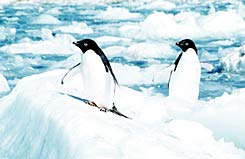A huge glacier blocks their access to food

A remnant of the largest glacier ever recorded is blocking Antarctica's McMurdo Strait, putting thousands of penguin chicks at risk of starvation and cutting off a supply route to three research stations.
According to Lou Sanson, director general of the government science agency "Antarctica New Zealand", the area of the glacier, known as B15A, is about 3,000 square kilometers. Sanson called the glacier "the largest floating thing on Earth right now" and said that American researchers estimate that it has enough water to fill the entire drainage basin of the Nile River for 80 years.
The glacier is so large that it blocks air and water currents that normally break up floating ice floes in McMurdo Strait during the Antarctic summer, which begins in late December. The American McMurdo station and the New Zealand Scott base are located on the shores of the strait. The Italian Terra Nova base is nearby.
The glacier stands in the way of four ships that are expected to reach Antarctica within a month with fuel and food for the three stations. Scientists are now looking for solutions to the situation, including cutting a 130 km long path through the ice. Although the situation is worrying, there is currently no danger that the supply at the stations will run out, Sanson said.
However, it is difficult to express the same optimism regarding the Adele penguin chicks. These may die in droves in the coming weeks, because the ice formation in the strait has cut off their parents' access roads to their fishing grounds.
Penguins are important to science as markers of environmental changes, such as global warming. The glacier threatens two of four colonies in the area, which has been studied by scientists for 25 years. One of the colonies nests at Cape Royds and includes about 3,000 fertile pairs of Adele penguins. These are now faced with a 180 km journey if they want to bring food to their chicks at the nesting sites. But the parents cannot withstand such a long journey without eating a large part of the food they have collected for the chicks, Sanson said.
Penguins carry their chicks' food in a pouch around their necks, and if they are hungry enough, they will eat the food themselves. "Penguin researchers predict that the annual hatch is likely to fail, with a high degree of certainty," Sanson said. That is, most of the chicks will die.
About 50 fertile pairs of Adele penguins nest in nearby Cape Bird. The scientists fear that they too are expected to suffer a similar fate, and that only about 10% of them will be able to raise a chick in the coming season. Adult penguins in the Cape will have to go on a journey of 100 km on the ice, to reach the open sea and food.
Peter Wilson, head of New Zealand's project to study four Adele penguin colonies in the area, said the ice blockage "is a very serious event for these colonies". Penguins reach maturity and first reproduction at the age of three years. Wilson predicted that Cape Royds chicks would hatch from their eggs but starve to death, and that most Cape Bird chicks would die. However, he believes that the colonies will survive, although their population may be reduced by more than 70%.
The earth also shook in Antarctica
An earthquake measuring 8.1 on the Richter scale shook a group of islands in the South Pole last Friday, where 850 penguins live. The epicenter was at a depth of about 10 km below sea level and about 400 km from the Macquarie Islands, and it did not cause tsunami waves. The penguin population was not harmed. The noise was also felt in Tasmania, which is about 1,000 km away from the group of islands. The last earthquake of similar intensity that occurred in the Macquarie Islands region was in 1924.
